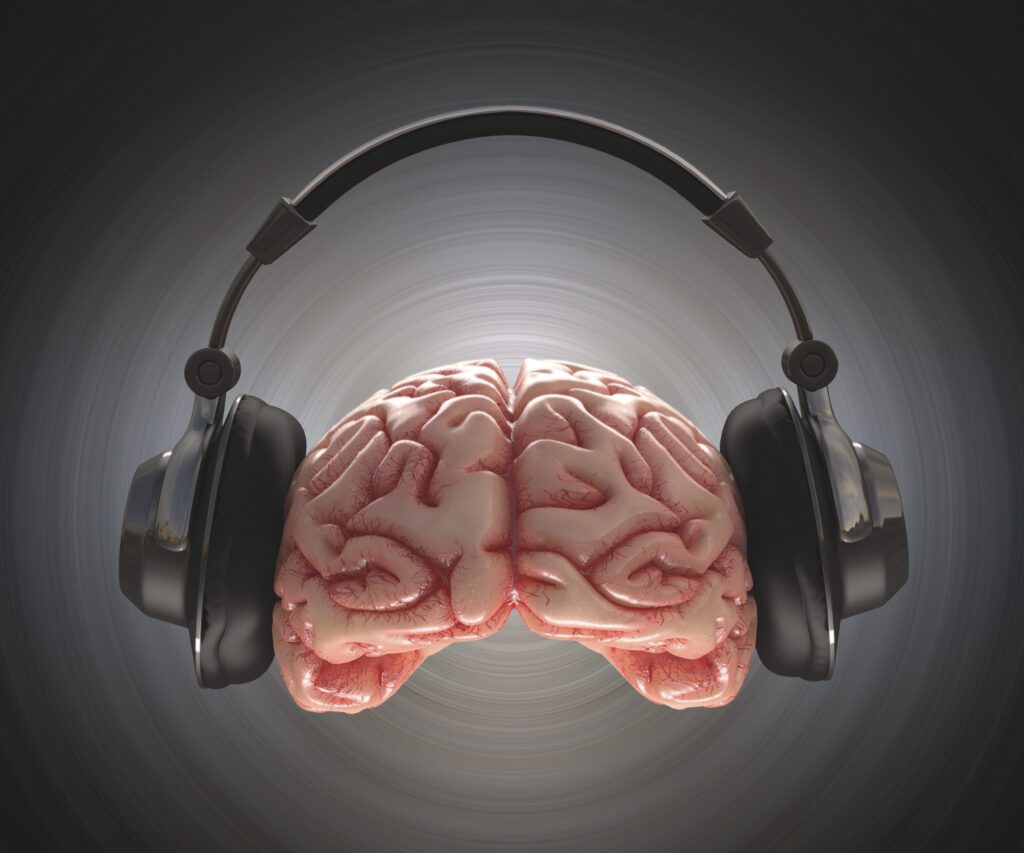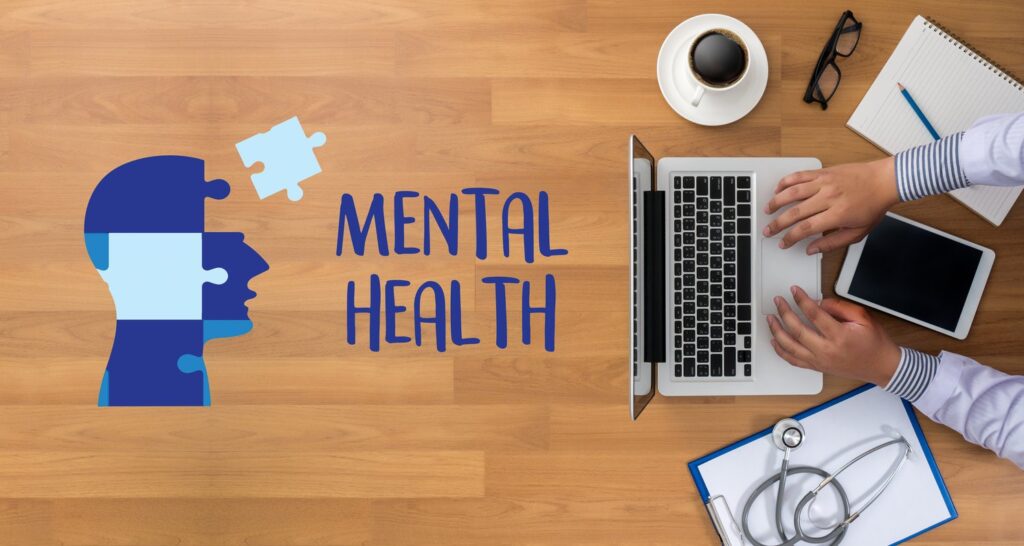Abstract
The coronavirus (covid-19) pandemic has had numerous effects on global societies, including socially, politically, and economically. Social distancing regulations, school closures, mandatory use of personal protective equipment (PPE), amongst increasing financial burdens due to unemployment, have all contributed to a rise in societal mental health challenges. Listening to music can be perceived as an effective means through which mental health challenges can be alleviated, thereby contributing to positive wellbeing. This study aims to understand the effects of music on mental health and covid-19. There is an endeavour to recommend solutions to facilitate individuals towards improved mental wellbeing through music. A systematic literature review has
been implemented within this study. Results have revealed the following factors: music and relaxation; music and inspiration; music and mood; music and expression. This study has deduced that that listening to music can have a positive impact on mental wellness as it can change emotions only if music is chosen correctly. Individuals feeling anxious or depressed tend to intensify their emotions by listening to depressing music, alternatively they can choose music to alter their emotions to happy and excited. Essentially music has the power to set the mood, create emotional changes promote sustainable mental health healing which can be utilised in the contemporary world post-covid-19.
Keywords:
Covid-19, Mental health, Music, Society
Introduction
The coronavirus (covid-19) pandemic has had numerous effects on global societies, including socially, politically, and economically (Somani, Post Covid-19 Effects on the Future of Students in Higher. , 2021). Social distancing regulations, school closures, mandatory use of personal protective equipment (PPE), amongst increasing financial burdens due to unemployment, have all contributed to a rise in societal mental health challenges (NHS, 2020). Studies relating to students within higher education institutions revealed an increase in negative mental health impacts. This was due to worries about implications of being infected with covid-19, the rapid transition to remote learning, the impact on exam results and future employment prospect, access to appropriate
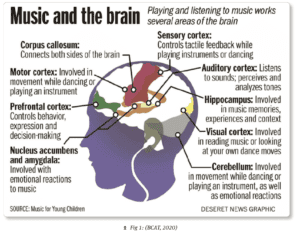
Fig 1: (BCAT, 2020)
hardware and software to continue education and financial constraints. The negative mental health impacts include heightened stress, anxiety, depression, and loneliness (Somani, The Impact of COVID-19 on Human Psychology, 2020). Research has suggested that one in six individuals are affected by common mental health challenges like anxiety and depression in one week within England (McManus, Bebbington, Jenkins, & Brugha, 2016). Results have indicated that approximately fifty-one percent of students are experiencing heightened anxiety and stress in comparison to January 2021 and approximately eighty-eight percent of students believe that their higher educational institution is facing a mental health crisis (Meal, 2022).
Music is considered to be an integral component of the lives of individuals and a contributing element to identity. Individuals generally listen to music daily in the form of background while doing other activities like studying, working, household chores, sports or shopping etc, or intentionally. Although the music is not the dominant focus while it is playing in the background, music is carefully chosen to match cognitive and emotional needs of individuals for the situations (Ziv & Hollander-Shabtai, 2022). For many years music has been utilised as a tool to cope with the challenges and victories of life. Listening to music can be perceived as an effective medium through which mental health challenges can be alleviated thereby contributing to positive wellbeing. Figure 1 illustrates the how playing and listening to music works in several areas of the brain.
When individuals listen to music the brain releases chemicals like dopamine which is associated with feelings of pleasure and also oxytocin referred to as the love hormone. In addition, there is moderate research available to suggest that cortisol, the chemical released in the brain when individuals experience stress, can be reduced through listening to music (Adler, 2020) which suggest music has an effect on mental health.
Objectives
This study aims to understand the effects of music on mental health and covid-19. There is an endeavour to recommend solutions to facilitate individuals towards improved mental wellbeing through music. A systematic literature review has been implemented within this study.
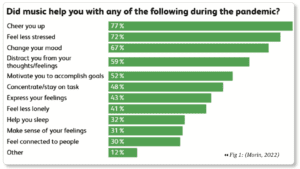
Results and Discussion
Music and relaxation
Healing using sound is historically believed to be a medium through which attempts were made to cure mental disorders in ancient Greece. Over time, music has been utilised to facilitate working faster, become more productive and create barriers against evil spirits. In addition, research has revealed multiple health benefits to individuals including decreasing stress levels and improving health and immunity. When experiencing symptoms of negative mental health challenges like anxiety, stress, and depression it is important that individuals learn to relax due to the potential consequences of negative mental health impacts which can lead to physical health problems and in extreme cases death (Somani & Saraswathy, Sort Stress & Stop Suicide, 2021). Thus, methods through which music can be used to relax individuals can include:
- Meditation with music and voiced instruction
- Sleep music that has been devised to relax the mind
- Positive affirmations with music
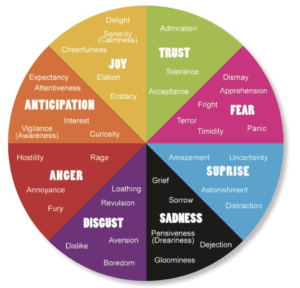
Fig 3: (KIIT, 2022)
These can all be administered alone, or with others a classroom situation, on video with live streaming, social media videos or downloading a mobile application. Meditative music consists of a cathartic effect which can improve moods, relax the mind and body. Sounds including nature sounds, stringed instruments and
the piano have been proven to help individuals relax (Nortje, 2020).
Music and inspiration
According to a brain health survey carried out by AARP music consisting of 3,185 adults it was reported that despite listening to musical performances, background music or music recordings, there was a positive impact on negative mental health diagnosis like anxiety and depression (Adler, 2020). Music is believed to improve intelligence, increase an individual’s ability to focus and heighten mental health. In addition, music can increase self-confidence and improve the immune system.
Research has revealed that music meditation can inspire individuals and has numerous health benefits including:
- Reducing stress
- Decreasing depression and anxiety
- Improving memory function
- Reducing blood pressure
- Reducing pain
- Decreasing cholesterol
- Reducing chances of stroke and heart disease
Utilising music as a therapy, can in- crease relaxation, decrease stress and inspire individuals towards research- ing their goals. When comparing mu- sic to taking prescription drugs to de- crease anxiety levels prior to a surgery, research has found that thirty minutes of therapeutic music has able to reduce anxiety and contribute to pain reduc- tion (Quach & Lee, 2017). Music can evoke positive emotions and promotes the brain’s reward centres. Individuals can experience this through dancing to music, singing or even chanting, writing songs, playing a musical in- strument, or even just listening to mu- sic to relax or meditate. Music has the power to inspire individuals towards achieving their goals and turning their negative moods into positive energy, inducing positive emotions and creat- ing a transit between negative mental
health challenges and good mental health. Making and listening to mu- sic promotes individuals to become more creative, this can be utilised to improve moods and vibrate at a higher emotional energy level. This leads to self-motivation facilitating individuals to accomplish their personal and pro- fessional goals.
During the covid-19 pandemic nu- merous individuals in society utilised music to help themselves overcome challenges and cope with the covid-19 restrictions. Within a survey that was conducted during the covid-19 pan- demic a question was asked to the population “Did music help you with any of the following during the pan-
demic?” Figure 2 illustrates the results that 77% of individuals revealed that music cheered them up, while 72% of people felt that music reduced their stress levels, 67% felt that music al- tering their moods, while 59% of peo- ple used music as a distraction from negative emotions and thoughts that were arising.
Music and mood
Music can be used as a tool to relax individuals and lift emotional vibrations linked to moods. Some students utilise music to facilitate retaining information during exams as they believe it to improve their concentration levels. Within the United States approximately 1 out of five people find it difficult to asleep (Helsestart, 2023). Hence relaxation music can facilitate individuals to relax into a deeper sleep and help change their mood. Music can be perceived as a form of escape taking them into a happy place. As individuals we experience an array of different moods which mirror our emotions and are projected through non-verbal communication and facial expressions. Figure 3 highlights many of the different emotions that humans feel through the wheel of emotion.
When individuals listen to familiar music, there is a release of the chemical dopamine in the brain which causes the brain to respond more strongly to situations. In contrast unfamiliar music can create brain stimulation as individuals enjoy the music they are listening to and become used to learning it. Binaural beat music utilised in subliminal and ambient music has been proved to improve feelings of anxiety and boost confidence levels. The mind can become shaper and confident through listening to Alpha waves that range between eight to fourteen Herts. When individuals are feeling negative emotions like anger, music has been proven to release these feelings through listening to music that can be viewed as angry as a method through which the negative emotions can be processed. Therefore, it is not surprising that individuals experiencing feelings of depression are more inclined to listen to music that reinforces their feelings. Individuals that ruminate a predictive trait of depression will usually be attracted to music that intensifies their emotions associated with depression (Garrido & Schubert, 2015).
Music and expression
Listening to music enables individuals to express their emotions and creative skills without talking. It allows individuals to communicate their thoughts and complex emotions through non-verbal communication and via various forms of expressions like playing a musical instrument or expressing feelings through dance. Releasing emotions through music, contributes towards positive mental health. When individuals are feeling fearful or nervous, by listening to isochronic tone music, it is possible to alter the brain state towards happiness and confidence. This is because the brain is syncing into a new frequency consisting of single tones beating at regular intervals that are spaced evenly (Healthline, 2020).
Music therapy is deemed as a holistic and creative approach to healing, simultaneously it facilitates positive and constructive strategies to cope with challenging situations.
Many studies have revealed that by listening to classical music, the mind can focus better as a tempo consisting of sixty beat per minute can increase processing information in the brain. In contrast electro dance music has been suggested to sharpen focus during studying (Reachout, 2022). Listening to music can facilitate social connections and reduce feelings of loneliness because there is a realisation that emotions are shared and can be expressed with others who can understand. This can include connecting with like-minded musicians, attending concerts, or sharing music via technology, emotions are being shared and expressed. Music can form and change behaviours as releasing negativity can contribute towards positive conversations and actions as individuals resort to acting with calmer minds, in contrast to acting through clouded judgment when they are overcome with negative emotions. Research has indicated that individuals experiencing depression are drawn to listen to music that reinforced their negative feelings because most of the time they are unable to choose music to help them feel better (Wilhelm, Gilllis, Schubert, & Whittle, 2013).
Conclusion
This study has deduced that that listening to music can have a positive impact on mental wellness as it can change emotions only if music is chosen correctly. Individuals feeling anxious or depressed tend to intensify their emotions by listening to depressing music, alternatively they can choose music to alter their emotions to happy and excited. Essentially music has the power to set the mood, create emotional changes promote sustainable mental health healing which can be utilised in the contemporary world post-covid-19.
Healthcare professionals have commenced utilising music therapy, with the endeavour of helping to support individuals who are aiming to regain control over their mental health wellbeing. Thus, it is evident
that music has multiple effects on mental health if used in the correct manner. When individuals decide to listen to songs or music that is upbeat, it has the power to make individuals feel happier emotions. However, over the last fifty years gradually the music made and produced, has become angrier and sadder which can make finding songs transiting individuals to a happier state more difficult, in turn contributing to mental health challenges (Napier & Shamir, 2018). It is advisable to create a list of “happy songs” to help navigate out of the looming negative emotions that can arise, hindering mental health. Music is a tool that can be used for individuals to deal with the uncertainty present in a continuously changing world. Listening to music can heighten emotions, change feelings and behaviours when utilised in the right context. Music can increase social connectedness and used as a medium through which societies and cultures can be brought together during times of distress.
Recommendations
Social awareness should be created on the benefits of music on mental health. Recommendations to practice techniques on active listening concentrating on the music, noting feelings, associated memories and changes within the body in relation to noting the urge to get up and dance or in contrast slow the heart rate down. This will facilitate individuals towards taking control, allowing the music to empower and change feelings from a negative to a positive. Individuals can also utilise technological advancements to listen to a variety of music genres across multiple internet connected devices, and personalised playlists. This will subject individuals to familiar music that comforts individuals, in addition to evoking positive memories and associations. During moments of unhappiness, depression, or anxiety it is recommended to choose and listen to upbeat music that makes individuals want to sing or dance. These are deemed to release stress and contribute to physical exercise and brain stimulation.
References
Adler, S. E. (2020, 06 30).
Music Can Be a Great Mood Booster. Retrieved from AARP: https://www. aarp.org/ health/br ain- health/ info-2020/music-mental-health. html#:~: t e xt=R esear c h%20 shows%20that%20music%20 can, of%20the%20str ess%20 hormone%20cortisol.
BCAT.
(2020, 12 11). MUSIC THERAPY AND THE ENDLESS BENEFITS. Retrieved
from BCAT: http://www.bcat.info/ life -in-arts-therapy—the – bcat- blogstop/music-therapy-and-the- endless-benefits
Garrido, S., & Schubert, E.
(2015). Moody melodies: do they cheer us up? A study of the effect of sad music on mood. Psychol. Music, 244–261.
Healthline. (2020, 02 28).
Do Isochronic Tones Have Real Health Benefits? Retrieved from Healthline: https://www.healthline.com/health/ isochronic-tones
Helsestart. (2023, 01 20).
Global Insomnia Statistics in 2022 & 2023. Retrieved from Helsestart: https://www.helsestart.no/news/ global-insomnia-statistics
KIIT. (2022, 12 09).
Emotions. Retrieved from KIIT INTERNATIONAL SCHOOL LIBRARY:
https:// kiitislibrary.weebly.com/ emotion.html
McManus, S., Bebbington, P. E., Jenkins, R., & Brugha, T. (2016). Mental health and wellbeing in england: The adult psychiatric morbidity survey 2014. NHS Digital.
Meal, K. (2022, 01 12).
College Students More Concerned About COVID-19 Than Ever, New Survey by TimelyMD Finds. Retrieved from TimelyMD: https://timely.md/ college-students-more-concerned- about-covid-19-than-ever/
Morin, A. (2022, 01 04).
A Verywell Report: Music Helped Most of Us Get Through the Pandemic. Retrieved from Verywellmind: https:// www.verywellmind.com/verywell- report-music-helped-us-through-the- pandemic-5181803
Napier, K., & Shamir, L. (2018). Quantitative Sentiment Analysis of Lyrics in Popular Music. Journal of Popular Music Studies, 161–176.
NHS. (2020, 01 23). Counselling for student mental health problems. Retrieved from National Health Service: https://www.nhs. uk/conditions/stress-anxiety- depression/student-mental-health/
Nortje, A. (2020, 10 28).
6 Relaxation Techniques for Managing Anxiety and Stress. Retrieved from Positive Psychology: https:// positivepsychology.com/relaxation- techniques-anxiety/
Quach, J., & Lee, J. (2017).
Do music therapies reduce depressive symptoms and improve QOL in older adults with chronic disease? Nursing, 58-63.
Reachout. (2022, 12 12).
How to use music for mental health. Retrieved from Reachout: https:// au.reachout.com/articles/how-to- use-music-for-mental-health
Somani, P. (2020).
The Impact of COVID-19 on Human Psychology. In B. S. Lal, & N. Patel, Economics of Covid-19 Digital Health Education & Psychology (pp. 328-357). New Delhi: Adhyayan Publishers & Distributors.
Somani, P. (2021).
Post Covid-19 Effects on the Future of Students in Higher. . International Journal of Social Science And Human Research, 831-834.
Somani, P., & Saraswathy, R. V. (2021). Sort Stress & Stop Suicide. Bengaluru: St.Mother Theresa University.
Wilhelm, K., Gilllis, I., Schubert, E., & Whittle, L. E. (2013).
On a blue note: depressed people’s reasons for listening to music. Music Med.
Ziv, N., & Hollander-Shabtai, R. (2022).
Music and COVID-19: Changes in uses and emotional reaction to music under stay-at-home restrictions. Psychology of Music, 475–491.
Prof. Dr. Parin Somani
Director: London Organisation of Skills Development Email: drparinsomani@gmail.com
Website: www.parinsomani.com
https://doi.org/10.57259/GRJ6348
Bio
Prof. Dr. Parin Somani, Director: London Organisation of Skills Development, Independent Academic Scholar, TEDx Speaker, Educator, International Motivational speaker, Author, Writer, Banker, Humanitarian, Philanthropist, Multi-International Award Winner. 8 Doctorate degrees recognised 5times in World Book of Records, twice in India Book of Records, Asia Book of Records, Karnataka Book of Records and Golden Book of World Records. Helps global societies in Education, Women Empowerment, Youth Development. Travelled 107+ countries globally. Published 41+ educational papers, newspaper/magazine articles, 19books, featured in 100+ videos, 177+ newspapers/ books. During COVID-19 she has educated 100,000+people globally, delivered research at Harvard University, in- vited by Governors of India.
Nurbanu Somani
Postgraduate Research Student
Email: nurbanu.somani@pgr.aru.ac.uk
Bio
Nurbanu is a postgraduate researcher at Anglia Ruskin University, in Cambridge, exploring the therapeutic benefits of music to promote health and wellbeing in older adults with late onset of vi- sion loss. She is passionate to connect with people and bring joy into their lives by promoting music as an outlet for comfort and emotional expression.
Research Objectives
This study aims to understand the effects of music on mental health and covid-19. There is an endeav- our to recommend solutions to facilitate individuals towards improved mental wellbeing through music.

